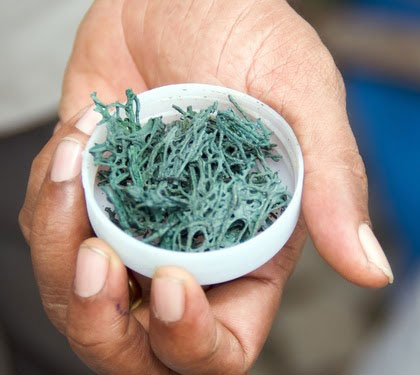How is Hashimoto’s disease different from Graves’ disease? How do they compare, and how do you know if you’re struggling with either of them? In this article, I want to shine a light on some of the thyroid issues you might be having and help you determine what might be going on.
- Have any questions?
- 480-631-7837
- support@in-goodhealth.com

Are Sea Vegetables and Algae Safe for Your Thyroid?
August 5, 2024
Better Than ‘Cream of Mushroom’ Chicken & Rice
August 8, 2024
Are Sea Vegetables and Algae Safe for Your Thyroid?
August 5, 2024
Better Than ‘Cream of Mushroom’ Chicken & Rice
August 8, 2024Recommended Product: Living with Graves’ Disease? You’re not alone. This autoimmune condition can cause hyperthyroidism, leading to symptoms like anxiety, heart palpitations, weight loss, and bulging eyes.
Introducing the Graves’ Disease Bundle, your comprehensive solution to manage Graves’ Disease and reclaim your well-being. This powerful three-part program combines targeted support to address various aspects of this condition. Click Here
What Do Hashimoto’s and Graves’ Disease Have In Common?
For starters, both diseases are autoimmune disorders and thyroid diseases. The thyroid is a small gland that makes hormones that govern how well we generate energy, how we repair our skin, hair, and nails, how our gut works, and plenty more processes.
A Continuum of Expression: Hashimoto’s and Graves’ Disease
Interestingly, many experts now consider Hashimoto’s and Graves’ disease as part of a continuum of autoimmune thyroid disorders. Rather than being entirely distinct diseases, they represent different expressions of the same underlying immune dysfunction.
This continuum perspective suggests that the immune system’s attack on the thyroid can result in underactive (hypothyroidism) or overactive (hyperthyroidism) thyroid function, depending on which thyroid structures are targeted and how the immune response evolves. This viewpoint helps to explain why some patients may experience symptoms of both conditions or even transition from one condition to the other over time.
Key Insight: Almost all thyroid disease comes about from autoimmune disease.
What Is Autoimmune Disease?
Imagine your immune system like a security guard. It protects you and keeps you safe from potential danger — they chase away perceived threats. When it comes to a burglar or someone breaking into your home, that is an ideal thing to have.
But what happens if your immune system starts chasing away the person who delivers your mail? That would be wrong because that person belongs out there and is not much of a threat — we can understand that as an allergic response.
Then, what would happen if your immune system started attacking your dog? Your dog is not only harmless but also belongs inside your home. That is what we can consider an autoimmune disorder—your immune system attacking something that belongs in your body.
Key Insight: Hashimoto’s disease and Graves’ disease are the two main autoimmune forms of thyroid disease. Generally, Hashimoto’s is the leading cause of hypothyroidism, and Graves’ is the leading cause of hyperthyroidism.

Understanding Hashimoto’s and Graves’ Disease
While Hashimoto’s is the leading cause of hypothyroidism and Graves’ is the main cause of hyperthyroidism, they’re almost the same disease. They are very similar.
The genes for thyroid disease are genes of iodine tolerance. Those who don’t tolerate iodine, as well as others, are more prone to develop various versions of autoimmune thyroid disease.
There are also different parts of the thyroid that one might attack. That’s because the thyroid, as one of many glands, is controlled by the pituitary and hypothalamus within the brain.
The cycle plays out like this:
- Your thyroid relaxes and does nothing until it is told to work
- It will then work in proportion to the ‘loudness’ of a signal it receives (TSH)
There is a receptor for TSH that sits outside of the thyroid. Essentially, your pituitary releases some TSH into your bloodstream, it hits the receptor, your thyroid is told to work, and it gets to work at the exact amount that the TSH demands.
In cases of Graves’ disease, the immune system attacks the receptor. Even with no TSH being sent to your receptor, because your pituitary does know that something is wrong, that damage to the receptor keeps your thyroid making hormone because it thinks it’s being told to work.
On the other hand, with Hashimoto’s disease, an enzyme that activates iodine called thyroperoxidase and a protein that stores iodine called thyroglobulin are involved. In cases of Hashimoto’s, both of those things are typically the target of the immune attack.
Hashimoto’s essentially attacks things within your thyroid that make hormones. This causes a deficiency in your thyroid’s ability to make hormones in line with the TSH.
How Often Is Hypothyroidism From Hashimoto’s?
About half of people with hypothyroidism have measurable Hashimotp’s antibodies. But, many people with Hashimoto’s don’t have measurable antibodies. Most estimates would say that about 95-97% of hypothyroidism comes from Hashimoto’s.
When it comes to the other side of the coin, Graves’ disease causes about 80% of hyperthyroidism in adults. Other causes can include:
- Toxic nodular goiter
- Pituitary abnormalities
- Acute short-term thyroiditis
- Other rare conditions
What Is Thyroid Stimulating Immunoglobulin?
This is an example of a thyrotropin (another name for TSH) receptor antibody. These antibodies might block thyrotropin or activate it, so they can make your thyroid completely oblivious to TSH or make it think there is more than what is there.
Most commonly, they cause it to do the second, making your thyroid overactive. This is called TSI, and there is a much higher likelihood of overlap between Graves’ disease and TSI than there is with TSI and Hashimoto’s disease.
Key Insight: About 90-95% of those with Graves’ disease will have measurable TSI levels.
Hashimoto’s Disease Versus Graves’ Disease: Symptoms
When we talk about Hashimoto’s disease, the main symptoms are often the symptoms most associated with hypothyroidism. The classic ones include:
- Fatigue
- Weight gain
- Hair loss
On the other hand, with Graves’ disease, we need to acknowledge the most typical hyperthyroid symptoms. Those can include:
- Nervousness
- High heart rate
- Tremors
- Sweats
- Weight loss
The symptoms are far more distinct at the extreme levels of low and high. I want you to know that everything in between can feel a lot more of the same. Most have mild to moderate hypo and hyperthyroid symptoms.
Key Insight: You may have symptoms that are both typical of hypo and hyperthyroidism. Only at the extremes will the symptoms be far more distinct.
Hashimoto’s Versus Graves’ Disease: Treatment
Let’s talk about treatment. If Hashimoto’s is causing hypothyroidism, then the main treatment would be thyroid medication. In most versions of Hashimoto’s, though, it is not causing full hypothyroidism. It’s threatening the thyroid but is now slowing it down.
Those are cases where diet therapies work quite well. Diet and nutraceuticals can help most people suffering from Hashimoto’s disease. Many may be given thyroid medications for Hashimoto’s, but they don’t help with it at all.
Graves’ disease has three main categories of treatment:
- Medications to slow the thyroid
- Radioablation to destroy the thyroid
- Surgery to remove the thyroid
Medications are most common in the initial steps. They make the thyroid not absorb iodine, which eventually slows down the amount of hormone it releases.
Key Insight: Your thyroid works better if you consume 50 – 200 mcg of iodine daily. The same approach can help with both of these diseases, which is why the Thyroid Reset Diet can be effective for both.
If you manage Graves’ correctly, you have a very high chance of going into remission. I wrote the Thyroid Reset Diet to help people manage their iodine intake and ensure that they get back to a better place.
While some cases of Graves’ may involve radio-ablation or surgery, they are pretty rare. Most can do well with medication in the short term paired with diet therapies.
Getting To The Heart of Thyroid Issues
While diet is the cornerstone of helping manage the risks of both Hashimoto’s and Graves’ disease, all ways that make you healthier make your thyroid healthy. This includes:
- Sleep and relaxation
- Exercise
- A healthy wide range of foods
- Fresh air
- Good social connections
All of these things matter. Clinical trials have shown that diet alone, specifically the outlined approach that makes up the Thyroid Reset Diet, can reverse these things in most cases.
If you have Graves’ disease, please work with your healthcare partner to ensure that your thyroid has slowed down. In the case of Hashimoto’s, you’ll want tor ensure that you don’t have overt hypothyroidism (which may require medication).
I want you to remember from today that all of this can be helped, and has been studied to be helpful, with diet and lifestyle changes. I’d love for you to check out the Thyroid Reset Diet today to see more about how it can change the way your thyroid operates.

P.S. Whenever you are ready, here is how I can help you now:
- Schedule a Thyroid Second Opinion with me, Dr. C, Click Here for Details
- Need help to choose supplements? Click ‘Help Me Decide Here'
- Get my top books Here
Dr. Alan Glen Christianson (Dr. C) is a Naturopathic Endocrinologist and the author of The NY Times bestselling Hormone Healing Cookbook, The Metabolism Reset Diet, and The Thyroid Reset Diet.
Dr. C’s gift for figuring out what works has helped hundreds of thousands reverse thyroid disease, heal their adrenals, and lose weight naturally. Learn more about the surprising story that started his quest.







